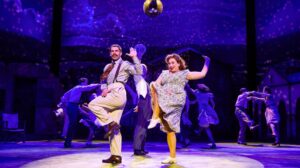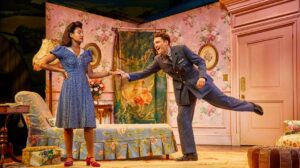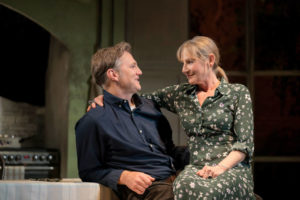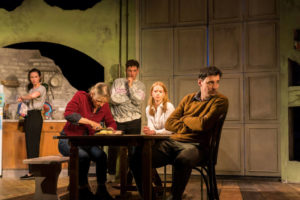Caroline Quentin flies high in WW2 comedy
★★★

Richard Bean and Oliver Chris took the characters and plot of Goldoni’s The Servant Of Two Masters and turned them into the modern classic One Man Two Guv’nors. Now they’ve tried the same approach with another 18th-century comedy, Richard Brinsley Sheridan’s The Rivals.
There are a lot of laughs, thanks in no small part to Caroline Quentin’s Mrs Malaprop: ‘I’m overcome with emulsion’ she says; and ‘ flatulence will get you everywhere’. There are also some well-executed elements of farce. But in the end, Jack Absolute Flies Again doesn’t quite take off. (Sorry, I couldn’t resist.)
There’s not the wow factor of the plot of One Man Two Guv’nors nor that play’s sudden and hilarious lurches in unexpected directions. It’s funny, certainly, but the action and some of the jokes are predictable in a way that Sheridan’s sure-footed, razor-sharp original never is.
Still, Emily Burns’ production offers a great deal of rollicking good fun. Actually, mostly rollicking: there is an underlying serious point about young people going off to war.
Fails to take off
The Rivals was written at the time of the American War of Independence. This version is also set during a war, World War Two, and in particular The Battle of Britain, which celebrated its 80th anniversary in 2020. Both were times when young men, perceived by an older generation as silly and unfit to fight, needed to shape up. And so they do, although there’s a great deal more silliness than shaping up. They are aided to maturity by the women in the play. Ultimately the play is a tribute to those ‘few’ young Spitfire pilots who took on the might of German air power.
The main plot (plot may be too strong a word) concerns ace pilot Jack Absolute. He’s infatuated with Lydia Languish but upper class Lydia has a romantic notion that her future lies with a member of the working class poor. She fixates on an engineer from the north: Dudley Scunthorpe. Kelvin Fletcher of Emmerdale and Strictly Come Dancing fame is well cast as a man of big guns and few words. Jack decides to disguise himself as Dudley in order to seduce her, thus becoming his own rival. Others fancy Lydia but are never serious rivals.
Jack Absolute is the flawed hero and played with the right blend of dash and deviousness by Laurie Davidson. His friend Roy is a classic silly ass, straight out of PG Wodehouse. Jordan Metcalfe imbues his character with a splendid mix of puppy love and jealousy.
Modern touches to story of war heroes
To show that the war effort was the work of more than upper class English ‘Brylcreem Boys’, the play also brings in an Australian pilot played by James Corrigan, a Sikh played by Akshay Sharan, and two women. The presence of a Sikh pilot is historically incorrect but is just one of a number of modern touches that stop the play being offensive in ways that these characters would undoubtedly have been at the time. This not only applies to race but to the many sexual references. One sensitive man speaks of the importance of consent. The women talk to each other frankly about sex- and, affectionately, about one of the men’s willies.

Let’s look at those women. They are not only liberated by the war but they are the most self aware characters. Lydia, played by Natalie Simpson (you may have seen her in the series Outlander), is a transport pilot; Julia, played by Helena Wilson, is an army driver. There is also the maid, Lucy, who is, as she says to the audience, ‘a dramatic device’. She’s the one who deliberately delivers love letters to the wrong people and causes mayhem. She regularly breaks the fourth wall to bring our attention to various theatrical devices and the mechanics of farce. Kerry Howard couldn’t be better in that familiar figure: the ironic, likeable servant, who is cleverer than her mistress and masters, and draws us into what we might otherwise think if as a ludicrous plot.
Caroline Quentin delivers comedy gold
But the glue that holds this otherwise flimsy kite together is Caroline Quentin’s Mrs Malaprop. She’s the first person we meet, when she too addresses the audience, and is pretty much the last. Maybe the malapropisms are overdone and a little too crude, but I enjoyed them. And they’re clever because, like Sheridan’s originals, the wrong word is often right one, as when she talks of ‘mutton dressed up as Spam’ (Spam being a cheap wartime tinned meat), or, referring to her birthday, ‘I passed a significant millstone’, or (I could go on for the whole review) when, in a moment of sexual excitement, she says she is ‘filled to the quim’. And Caroline Quentin delivers them with a delicious smile and perfect enunciation. There is also a moment when she does the splits, which is comedy gold.
Lovers of Strictly will not be surprised at her elasticity. And how lovely to see two alumni of that show dancing together. The dance is one of the highlights of the show, as all the cast join in on a Lindy Hop. In fact, it made me think this could one day be a great musical. Thank you, choreographer Lizzi Gee for that.
Mrs Malaprop and Sir Anthony Absolute (Jack’s father), represent the older generation, at first sceptical about these irresponsible young people, but slowly coming to see their qualities. Sir Anthony’s character may be overshadowed in this production by Mrs Malaprop, but Peter Forbes is outstanding as the reactionary, prejudiced, blustering army general (‘be quiet when I’m shouting’ he says), whose heart is gradually revealed.
Overall, it’s an excellent cast, but the young ones all seem nearer or over 30, rather than the 20 they should be. They don’t quite convey the gaucheness, the brash naivety of youth, that Richard Bean and Oliver Chris put across so well in the script.
The stage thrusts into the audience (well, bulges slightly). The set by Mark Thompson is a delight. It says: ‘this is the nostalgic England of pre-War.’ At the back is an English country house and countryside, complete with blue sky and fluffy clouds. But, on the lawn in front of the house, is a basic Nissan Hut- the RAF headquarters- which contrasts starkly with the house, and says there’s a war going on to defend those English values. Interior scenes roll on and off smoothly.
There’s an effective use of projections, designed by Jeff Sugg, of airplanes in deadly dog fights in the sky. The reality of planes hitting and being hit. Jack Absolute Flies Again itself is not quite a hit, but far from a miss.
Jack Absolute Flies Again can be seen at the National Theatre until 3 September 2022. Click here for tickets
This reviewer was provided with a press ticket by the producers.
Click here to watch the review on YouTube

